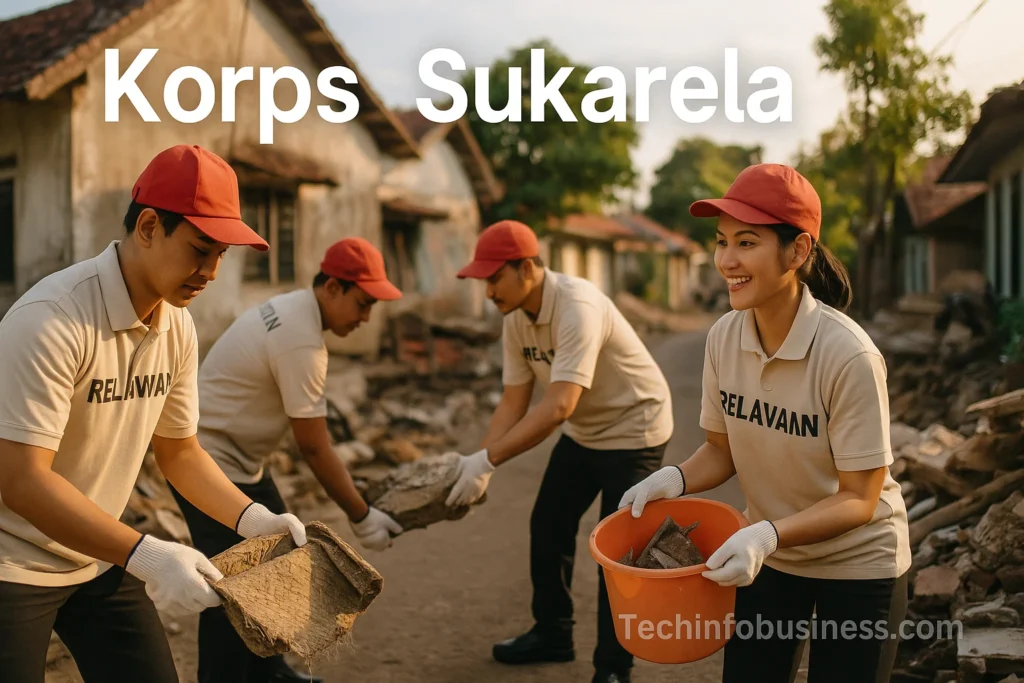Introduction: The Spirit Behind Korps Sukarela
In the heart of Indonesian society, there exists a quiet force that moves mountains without making noise. It’s not a government institution or a paid service—it’s Korps Sukarela, a volunteer organization built on the ideals of community, compassion, and civic duty. The name itself—Korps Sukarela, or “Volunteer Corps”—evokes images of ordinary citizens stepping forward in times of need, not for recognition or reward, but from a genuine desire to help.
Volunteering in Indonesia isn’t a new concept. It’s deeply rooted in the cultural tradition of gotong royong—mutual assistance and cooperation. But what distinguishes Korps Sukarela is its structured approach to civic volunteering. It serves as a formalized network through which individuals can contribute to disaster relief, public safety, education, and social outreach programs, often in cooperation with local police and government bodies. This article serves as your complete guide to understanding what Korps Sukarela is, how it works, and why it’s a vital piece of Indonesia’s social fabric.
The Historical Roots of Korps Sukarela
To understand Korps Sukarela, we must go back to the days following Indonesia’s independence in 1945. In the absence of formalized security institutions, communities began organizing their own volunteer groups to assist in maintaining peace and safety. These groups were not officially part of the military or police but played an essential auxiliary role. Over time, these loosely formed groups evolved into a more structured volunteer corps: Korps Sukarela.
In its early iterations, Korps Sukarela operated under the supervision of local government or police forces, particularly during periods of unrest or disaster. The need for civilian support in emergency response situations became more apparent with each passing year. Eventually, Korps Sukarela was recognized not just as a temporary solution, but as a sustainable, community-driven approach to public service.
Core Mission, Vision, and Values
At its core, Korps Sukarela exists to channel the energy, compassion, and skills of everyday people toward the common good. Its mission is to provide voluntary support in critical areas such as emergency response, public safety, community development, and educational outreach.
The vision is to cultivate a society where volunteerism is normalized—where individuals from all walks of life feel empowered to step up, whether during a flood, a fire, or a food drive. Korps Sukarela is built on the values of:
- Altruism – Helping without expecting reward
- Discipline – Operating under clear guidelines and responsibilities
- Solidarity – Uniting diverse people toward common causes
- Readiness – Being prepared physically and mentally to respond when needed
- Integrity – Maintaining transparency, honesty, and ethical behavior
These values aren’t just slogans—they’re embodied in the daily actions of thousands of volunteers across Indonesia.
Organizational Structure: Local Roots, National Reach
Korps Sukarela’s structure mirrors its grassroots origin while maintaining a framework that allows for regional and national coordination. It operates in three tiers:
- National Level – Provides strategic direction and training standards.
- Regional/Provincial Level – Coordinates between districts, handles logistics, and evaluates performance.
- Local Chapters – The heart of the movement; where volunteers are recruited, trained, and deployed.
Each local unit has a coordinator, a training officer, and team leaders who manage specific areas like disaster response, public safety, or educational outreach. This structure ensures Korps Sukarela remains flexible enough to respond to local needs while adhering to national goals.
Roles and Responsibilities of Volunteers
A Korps Sukarela volunteer wears many hats. Depending on the situation and their training level, volunteers may:
- Assist in natural disasters, such as evacuations, first aid, or distributing relief supplies.
- Provide support during public events, helping with crowd control or traffic safety.
- Conduct public health education in rural communities about hygiene or disease prevention.
- Organize clean-up drives, tree-planting campaigns, and environmental awareness events.
- Collaborate with police on neighborhood patrols, especially in high-risk areas.
- Facilitate youth programs in schools, promoting leadership, ethics, and disaster preparedness.
What sets Korps Sukarela apart from many informal volunteer groups is the training and commitment expected of its members. Volunteers often undergo regular drills, attend refresher workshops, and must follow a code of conduct.
Training and Development: More Than Just Good Intentions
Volunteering with Korps Sukarela is not just about showing up; it’s about showing up prepared. Volunteers are given training in various practical areas:
- Basic Life Support and First Aid
- Fire Safety and Evacuation
- Search and Rescue Techniques
- Conflict De-escalation and Public Interaction
- Effective Communication and Leadership
These skills not only make volunteers more effective in the field but also empower them in their daily lives. Many members of Korps Sukarela report that their involvement has boosted their confidence, career prospects, and social awareness.
Who Can Join and How?
One of the strengths of Korps Sukarela is its inclusiveness. There are basic eligibility criteria:
- Minimum age: usually 18 years old
- Physical and mental fitness
- Commitment to a minimum number of hours per year
- Willingness to adhere to the code of ethics and training sessions
The registration process typically involves:
- Contacting a local Korps Sukarela chapter or visiting their office.
- Completing a registration form and providing ID and medical clearance.
- Attending a basic orientation or introductory training.
- Taking an oath of service before becoming an active volunteer.
There are also specialized programs for students, retirees, and corporate volunteers, allowing individuals to serve in ways that align with their lifestyles and capabilities.
Benefits of Volunteering with Korps Sukarela
Joining Korps Sukarela is not about personal gain, but it certainly brings a range of personal and professional benefits:
- Skill Building: Training in leadership, teamwork, and emergency response
- Networking: Connect with community leaders, law enforcement, and NGOs
- Recognition: Public commendations and awards for outstanding service
- Job Opportunities: Enhanced employability, especially in public or civil services
- Mental Wellness: Fulfillment and purpose through meaningful action
Above all, volunteers gain the respect of their community—an honor that can’t be measured in money or medals.
Challenges and Areas for Growth
No organization is perfect, and Korps Sukarela faces its share of challenges:
- Resource Limitations: Not all chapters receive equal support or funding.
- Volunteer Retention: Maintaining enthusiasm and long-term commitment can be difficult.
- Training Gaps: Some regions lack access to consistent and advanced training.
- Public Awareness: Many people still don’t know how to get involved or what Korps Sukarela does.
These challenges represent opportunities for reform and innovation. Digital platforms, increased funding, and national campaigns can help grow and sustain the volunteer base.
The Future of Korps Sukarela in a Changing World
Indonesia, like many countries, faces increasing challenges—from climate change to rapid urbanization. As natural disasters become more frequent and social inequalities persist, the role of organizations like Korps Sukarela becomes more vital.
The future may see:
- Greater integration with digital tools for coordination and training
- Collaboration with international humanitarian bodies
- Expansion into urban slums and rural frontier areas
- Programs targeting youth empowerment, giving the next generation leadership opportunities
What remains unchanged, however, is the spirit of service. As long as Indonesians continue to believe in community, solidarity, and mutual aid, Korps Sukarela will have a place in society.
Conclusion: More Than a Uniform, It’s a Commitment to Humanity
Korps Sukarela is not just a volunteer corps—it’s a movement. It represents the best of what people can do when united by purpose rather than profit. Whether you are a student looking to serve, a retiree eager to stay active, or a professional with skills to share, this organization offers a meaningful way to give back.
The world needs more cooperation, more compassion, and more courage. In Indonesia, Korps Sukarela is leading that charge, one volunteer at a time.



